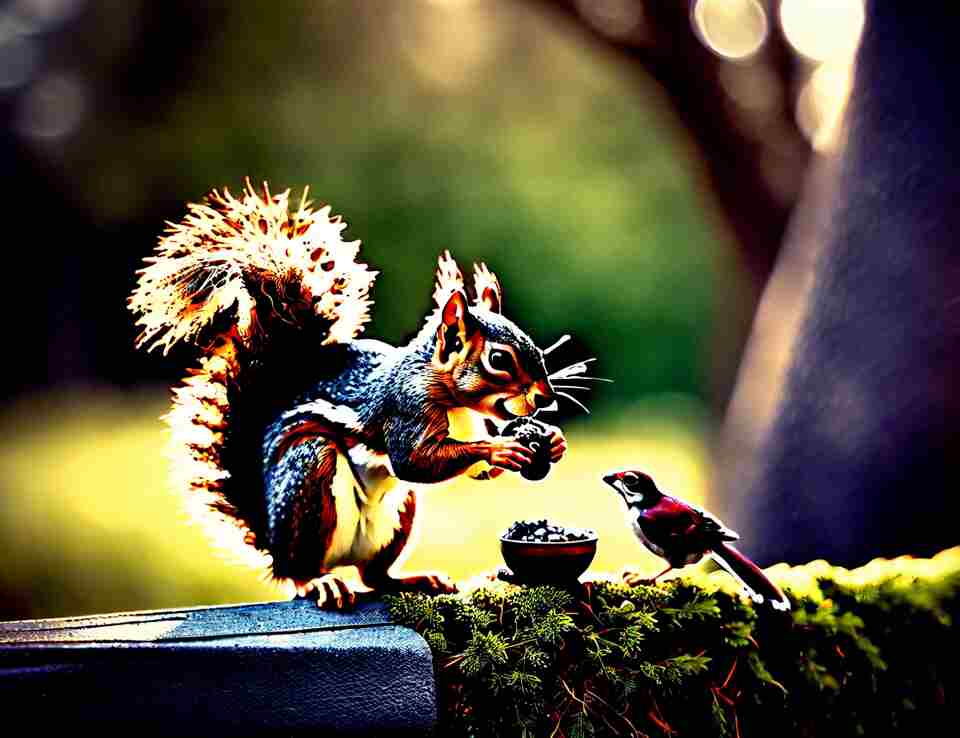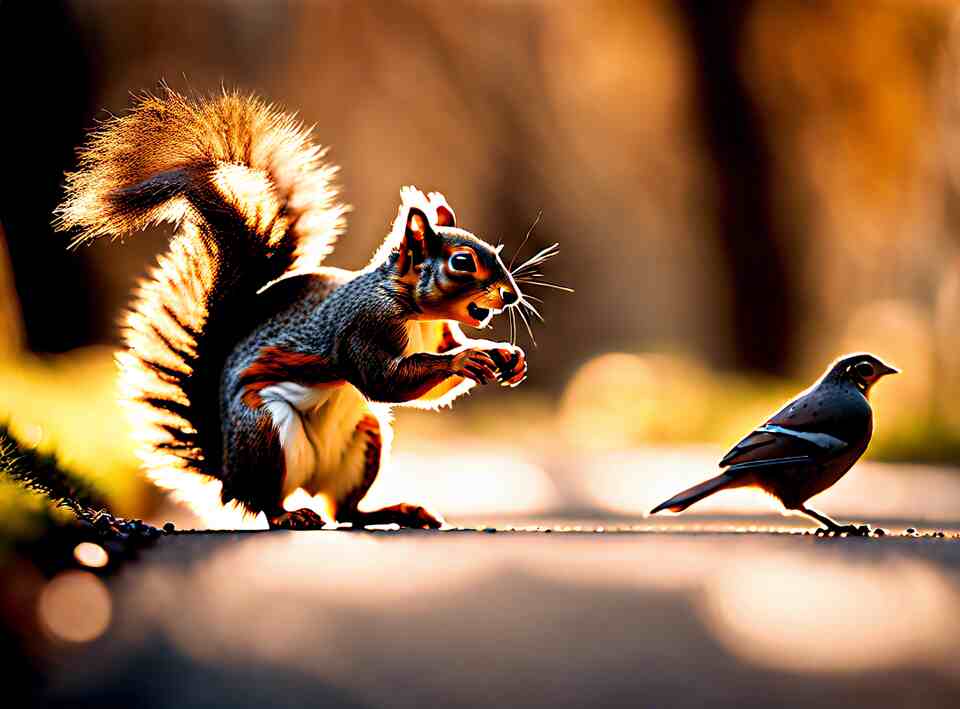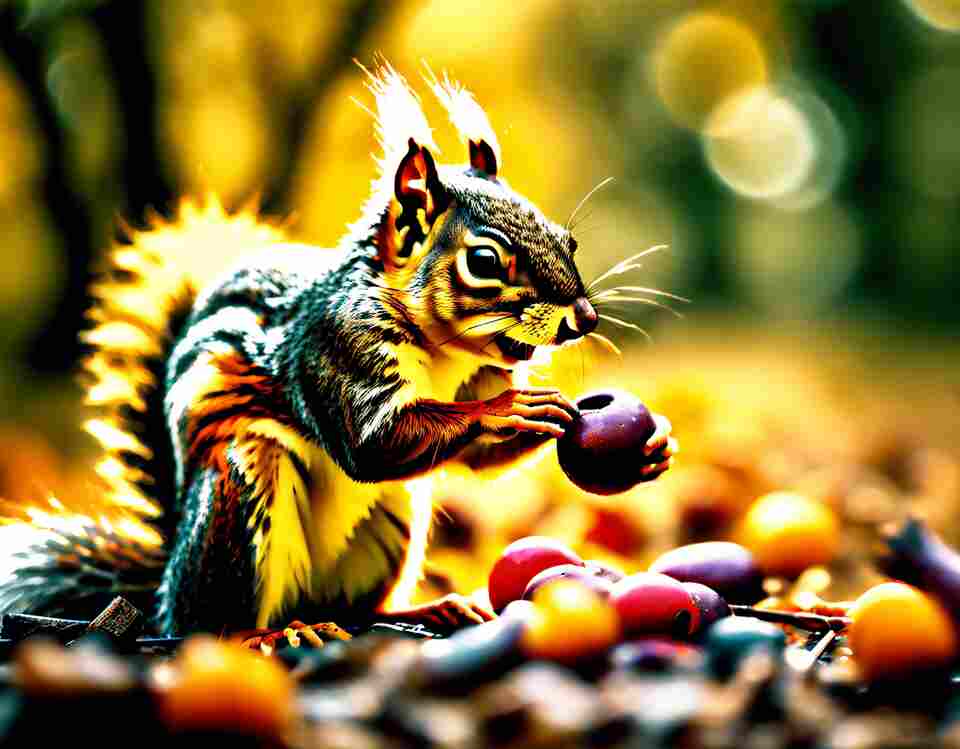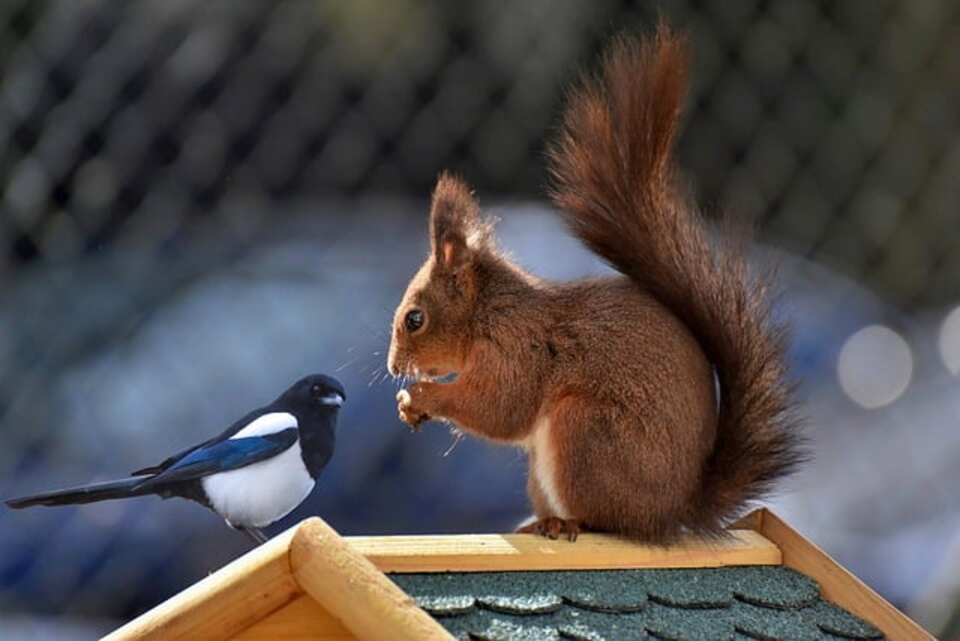Squirrels are commonly known for their nut-gathering antics and acrobatic skills in trees. However, one question that often arises is whether squirrels eat birds. Let’s dive into this topic to unravel the relationship between squirrels and birds in the wild.
Table of Contents
Understanding Squirrel Behavior
Squirrels are primarily herbivores, with their diet consisting of nuts, seeds, fruits, and plants. They are opportunistic feeders and often raid bird feeders to get easy access to seeds. Squirrels are known to be persistent and clever when it comes to obtaining food, showcasing their resourcefulness in various environments.
While squirrels are not classified as carnivores, there have been rare instances where they have been observed preying on birds. Squirrels may target bird nests for eggs or even young hatchlings, especially during times when food sources are scarce. However, these instances are not the norm and are considered exceptions rather than the rule.
Bird Feeder Dilemma
One common scenario where squirrels and birds interact is at bird feeders. Squirrels are notorious for stealing bird seeds and causing a nuisance for bird enthusiasts. To deter squirrels, many bird lovers use squirrel-proof feeders designed to prevent these furry creatures from accessing the seeds intended for birds.
Ecological Balance
In the wild, interactions between squirrels and birds are part of the natural ecosystem. While squirrels may occasionally target birds or eggs, they also serve as prey for larger predators such as hawks, owls, and snakes. This dynamic creates a delicate balance where each species plays a role in the overall health of the ecosystem.
Human Intervention
As human activities continue to encroach upon natural habitats, wildlife, including squirrels and birds, face new challenges. Providing appropriate habitats and food sources for both squirrels and birds can help mitigate conflicts and ensure the well-being of these creatures in shared environments.
While it may seem surprising that squirrels can sometimes eat birds, it is essential to understand that such instances are not common behavior for these furry animals. Squirrels play a vital role in the ecosystem, and their interactions with birds, whether cooperative or competitive, are part of the intricate web of nature. By appreciating and respecting the natural behaviors of wildlife, we can coexist harmoniously with the diverse species that share our world.

The Impact of Bird Feeders on Attracting Squirrels
Bird feeders are a popular way for bird enthusiasts to attract a variety of bird species to their gardens or yards. However, one unintended consequence of bird feeders is the potential attraction of squirrels. These furry creatures are notorious for raiding bird feeders, causing frustration for many bird lovers. In this article, we will explore the impact of bird feeders on attracting squirrels and provide insights on how to mitigate this issue.
Understanding Squirrels’ Behavior Around Bird Feeders
Squirrels are opportunistic feeders, and bird feeders provide them with a readily available source of food. Squirrels are known to be agile and persistent animals that can easily access bird feeders, often scaring away birds in the process. Their acrobatic abilities and sharp teeth make it challenging to deter them once they have discovered a bird feeder full of seeds or nuts.
Factors that Attract Squirrels to Bird Feeders
Several factors contribute to the attraction of squirrels to bird feeders. The type of bird feeder, the placement of the feeder, and the type of food offered can all influence squirrel behavior. For example, platform feeders and open trays are easily accessible to squirrels compared to tube or caged feeders. Additionally, placing bird feeders near trees or structures that squirrels can climb increases the likelihood of squirrel visits.
Strategies to Deter Squirrels from Bird Feeders
Despite squirrels’ best efforts to access bird feeders, there are strategies that bird enthusiasts can implement to minimize squirrel activity. One effective method is to use squirrel-proof bird feeders that feature mechanisms to prevent squirrels from accessing the food. These may include weight-activated perches or cages that allow only smaller birds to access the food.
Providing Squirrel-Friendly Feeding Stations
Another approach is to provide separate feeding stations for squirrels to divert their attention away from bird feeders. Squirrel feeders filled with corn, nuts, or seeds can lure squirrels away from bird feeders, reducing competition for food. By creating a designated area for squirrels to feed, bird lovers can help maintain harmony between squirrels and birds in their outdoor spaces.
While bird feeders are effective at attracting a variety of bird species, they can also inadvertently lure squirrels looking for an easy meal. Understanding squirrels’ behavior and preferences can help bird enthusiasts implement effective strategies to deter squirrels from bird feeders. By choosing squirrel-proof feeders and providing separate feeding stations for squirrels, individuals can create a balanced ecosystem that benefits both birds and squirrels in their natural habitat.
Natural Predatory Behavior of Squirrels Towards Birds
Squirrels are known for their playful nature and adorable antics, but they are also skilled opportunistic feeders. While they mainly feed on nuts, seeds, fruits, and plants, there have been instances where squirrels have exhibited predatory behavior towards birds. This behavior may come as a surprise to many, as squirrels are often perceived as harmless creatures.
Understanding Squirrels’ Diet and Behavior
Squirrels are omnivores, meaning they have a varied diet that includes both plant and animal matter. Their primary food sources consist of nuts, seeds, and fruits, but they are also known to consume insects, small rodents, and bird eggs. Squirrels have sharp incisors that allow them to crack open nuts and seeds, but they can also use these teeth for hunting smaller animals.
Do Squirrels Eat Birds?
Squirrels have been observed preying on birds in certain situations. While they do not actively hunt adult birds, they may target bird nests for eggs or young chicks. Squirrels are agile climbers and can easily access bird nests located in trees or shrubs. Once they reach the nest, they may consume the eggs or young birds inside. This behavior is more commonly seen in urban areas where squirrels and birds coexist in close proximity.
Factors Influencing Squirrels’ Predatory Behavior
Several factors may contribute to squirrels exhibiting predatory behavior towards birds. Competition for food sources, such as limited availability of nuts or seeds, can drive squirrels to seek alternative food options, including bird eggs. Additionally, environmental changes or disturbances to squirrels’ natural habitat may impact their food availability, leading them to explore new food sources.
Impact on Bird Populations
While squirrels eating birds may not pose a significant threat to bird populations on a large scale, it can have localized impacts. For some bird species, losing a clutch of eggs or young chicks to a squirrel can affect their breeding success for the season. However, birds have evolved various strategies to protect their nests from predators, including building them in hidden or inaccessible locations.
Coexistence in Urban Environments
In urban environments where squirrels and birds share the same spaces, it is essential to maintain a balance to ensure the well-being of both wildlife populations. Providing adequate food sources for squirrels, such as bird feeders stocked with nuts or seeds, can help reduce their incentive to hunt birds. Additionally, placing birdhouses in safe locations out of squirrels’ reach can protect nesting birds from potential threats.
While squirrels primarily feed on plant-based foods, they may exhibit predatory behavior towards birds under certain circumstances. Understanding the factors influencing this behavior can help promote coexistence between squirrels and birds in shared habitats. By implementing strategies to minimize potential conflicts, such as ensuring food availability for squirrels and protecting bird nests, we can support the diverse wildlife populations that enrich our surroundings.

Strategies to Prevent Squirrels from Consuming Birds
Squirrels are known for their voracious appetites and resourcefulness when it comes to finding food. One common question that arises is whether squirrels eat birds. While squirrels are primarily herbivores and their diet consists mainly of nuts, seeds, fruits, and fungi, they are opportunistic feeders and may occasionally consume birds, eggs, or nestlings. This behavior can be distressing for bird enthusiasts, especially those who have feeders in their yards. Fortunately, there are strategies that can be implemented to prevent squirrels from consuming birds and their eggs.
Understanding Squirrel Behavior
Before delving into prevention strategies, it is essential to understand squirrel behavior. Squirrels are agile climbers and jumpers, with the ability to access bird feeders and nesting boxes with ease. They are also persistent creatures that will go to great lengths to obtain food, making them a challenge to deter. By understanding squirrel behavior, you can implement more effective prevention measures.
Utilizing Squirrel-Proof Bird Feeders
One of the most effective ways to prevent squirrels from consuming birds is by using squirrel-proof bird feeders. These feeders are specifically designed to deter squirrels while still allowing birds to access the food. Squirrel-proof feeders often feature mechanisms such as weight-activated perches or cages that prevent squirrels from reaching the seeds. Placing these feeders in strategic locations away from jumping points, such as trees or roofs, can help deter squirrels effectively.
Implementing Physical Barriers
Another effective strategy is to implement physical barriers that prevent squirrels from accessing bird feeders or nesting areas. Installing baffles or cones on poles supporting bird feeders can make it challenging for squirrels to reach the food. Additionally, enclosing nesting boxes in wire mesh or placing them on poles with predator guards can help protect nesting birds from squirrel predation.
Providing Alternative Food Sources
To further deter squirrels from consuming birds, consider providing alternative food sources specifically for squirrels. By offering a dedicated squirrel feeder filled with nuts, seeds, or corn, you can redirect the squirrels’ attention away from bird feeders. This strategy not only helps prevent squirrels from targeting birds but also ensures that these charismatic creatures have access to food without causing harm to other wildlife.
While squirrels may occasionally consume birds, eggs, or nestlings, there are effective strategies that can be implemented to prevent this behavior. By understanding squirrel behavior, utilizing squirrel-proof bird feeders, implementing physical barriers, and providing alternative food sources, you can create a wildlife-friendly environment that protects both birds and squirrels. With these strategies in place, you can enjoy the beauty of birds in your yard without the risk of squirrel predation.
Harmonious Coexistence: Bird-Friendly Yard Tips with Squirrels
When it comes to maintaining a bird-friendly yard while coexisting harmoniously with squirrels, there are several tips and strategies you can implement to create a balanced ecosystem for both species to thrive. By understanding the behavior of squirrels and birds, as well as making simple modifications to your outdoor space, you can encourage peaceful interactions and promote biodiversity in your yard.
Understanding Squirrel Behavior
Squirrels are omnivores, meaning they have a diverse diet that consists of both plant matter and animal protein. While their primary food sources include nuts, seeds, fruits, and fungi, squirrels are opportunistic feeders and will consume insects, bird eggs, and even small birds if given the chance. However, it is important to note that squirrels do not actively hunt birds as a main food source but may opportunistically target nests for eggs or young birds.
Providing Squirrel-Friendly Food Sources
To deter squirrels from targeting birds in your yard, consider providing designated feeding stations for squirrels with foods they enjoy, such as corn, nuts, and grains. By offering a separate food source specifically for squirrels, you can help reduce competition for bird feeders and minimize the risk of squirrels disturbing nesting birds or consuming their eggs.
Implementing Bird-Friendly Feeding Practices
When setting up bird feeders in your yard, opt for feeder designs that are squirrel-resistant or equipped with baffles to prevent squirrels from accessing the food. Additionally, consider placing feeders at a sufficient height or distance from trees and structures to minimize squirrel interference while still allowing easy access for birds. Choosing birdseed blends that are less appealing to squirrels, such as safflower seeds or nyjer seeds, can also help deter unwanted squirrel activity around feeders.
Creating Safe Spaces for Birds
To protect birds from potential squirrel threats, ensure that birdhouses and nesting boxes are securely installed in locations that are difficult for squirrels to reach. By mounting birdhouses on poles with predator guards or installing them on smooth surfaces without nearby perches for squirrels to jump from, you can provide safe nesting environments for birds to raise their young without the risk of squirrel predation.
Maintaining a Balanced Ecosystem
Ultimately, fostering a bird-friendly yard with the presence of squirrels requires finding a delicate balance between supporting both wildlife populations. By incorporating squirrel-proofing measures around bird feeders and nesting areas, as well as providing suitable food sources for squirrels away from bird habitats, you can create a harmonious environment where both birds and squirrels can coexist peacefully while contributing to the biodiversity of your outdoor space.
Key Takeaway:
While squirrels primarily feed on nuts, seeds, fruits, and insects, there have been rare instances where squirrels have been observed preying on birds. It is essential to understand the diet of squirrels in the wild to prevent them from attacking bird feeders. By taking preventive measures like using squirrel-proof feeders or placing feeders strategically, one can peacefully coexist with squirrels and birds in their backyard. Common misconceptions about squirrels and bird predation should be dispelled to appreciate the complex interactions between these animals in nature. By being informed and proactive, both squirrels and birds can thrive harmoniously in the same ecosystem.

Conclusion
The question of whether squirrels eat birds is a complex one. While squirrels are primarily herbivores, there are instances where they may consume birds, especially when food sources are scarce. The presence of bird feeders can inadvertently attract squirrels, leading to potential conflicts between these backyard visitors. Furthermore, squirrels exhibit natural predatory behavior towards birds, though it is not their primary source of food.
To prevent squirrels from consuming birds, various strategies can be employed. Using squirrel-proof bird feeders, placing feeders strategically away from trees or structures that squirrels can jump from, and providing alternative food sources for squirrels are effective ways to minimize bird predation by squirrels. Additionally, employing physical barriers such as baffles or cages around bird feeders can help deter squirrels from accessing bird food.
Creating a bird-friendly yard that also accommodates squirrels is possible with some thoughtful planning. Planting bird-friendly vegetation, providing nesting boxes for birds out of the reach of squirrels, and offering clean water sources can attract birds while minimizing potential conflicts with squirrels. It is essential to maintain a balance between attracting birds and managing squirrel populations to promote a harmonious coexistence in your backyard.
By understanding the natural behaviors of squirrels and birds, implementing preventative measures, and creating a conducive environment for both species, you can enjoy the beauty of wildlife in your yard while promoting a safe and sustainable ecosystem for all creatures. With a little effort and consideration, you can strike a balance that allows squirrels and birds to thrive together in harmony.


